Foundation Project: Innovation in Tourism Sustainability Post-COVID
VerifiedAdded on 2023/06/10
|7
|1968
|341
Project
AI Summary
This Foundation Year project investigates the role of innovation in the sustainability of the tourism industry following the COVID-19 pandemic, with a specific focus on the TUI Group. The project aims to understand the need for innovation, analyze the pandemic's impact on tourism sustainability, and determine the benefits of innovation in this context. The research employs a qualitative methodology, utilizing secondary data to explore the role of innovation in addressing challenges and promoting sustainability within the tourism sector. Key research questions address the role of innovation, the impact of COVID-19, risk management strategies, and the benefits of innovation for sustainability. The project concludes that innovation is crucial for the success and growth of tourism organizations, enabling them to adapt to changing circumstances, enhance sustainability, and achieve their organizational goals.
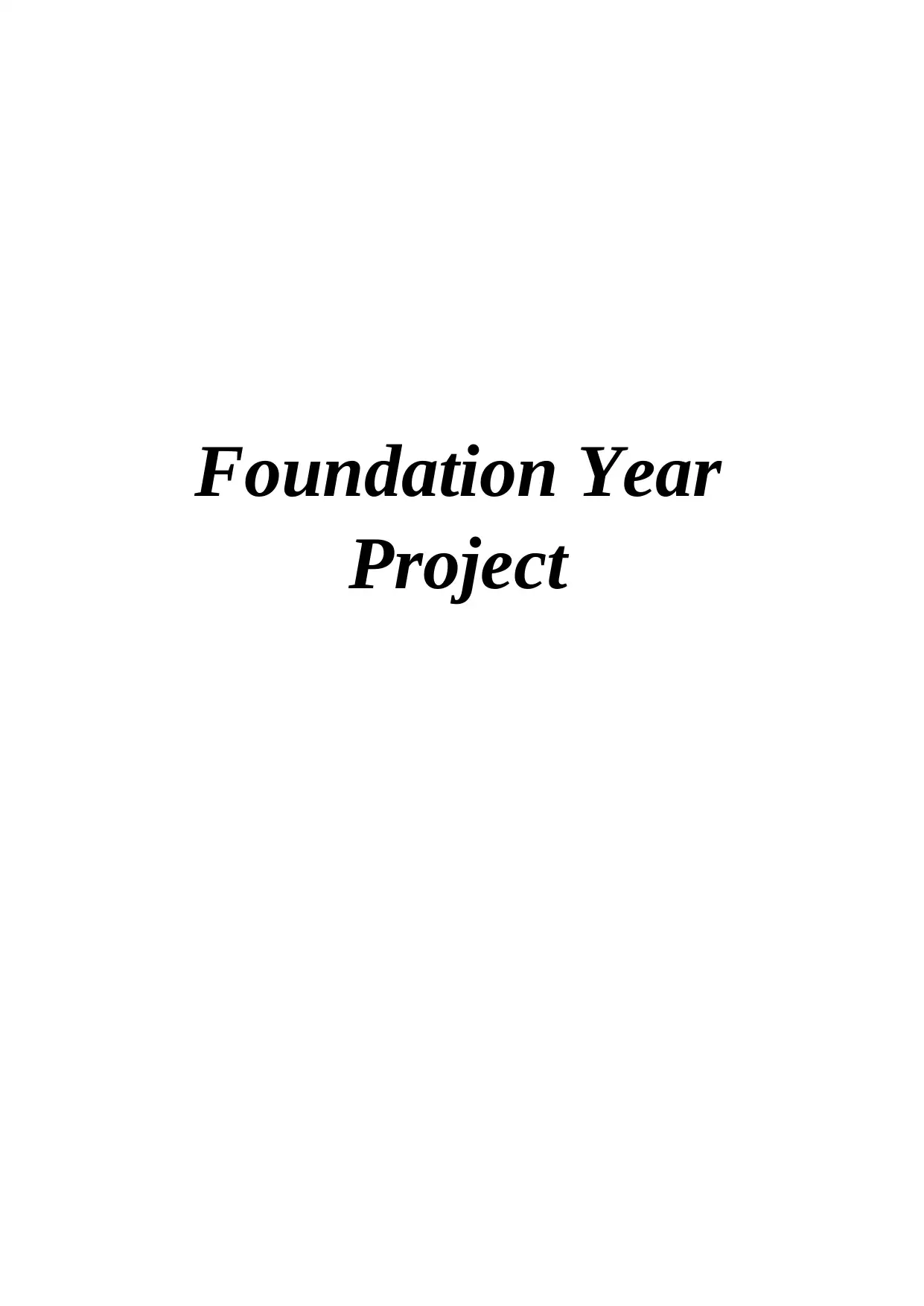
Foundation Year
Project
Project
Paraphrase This Document
Need a fresh take? Get an instant paraphrase of this document with our AI Paraphraser
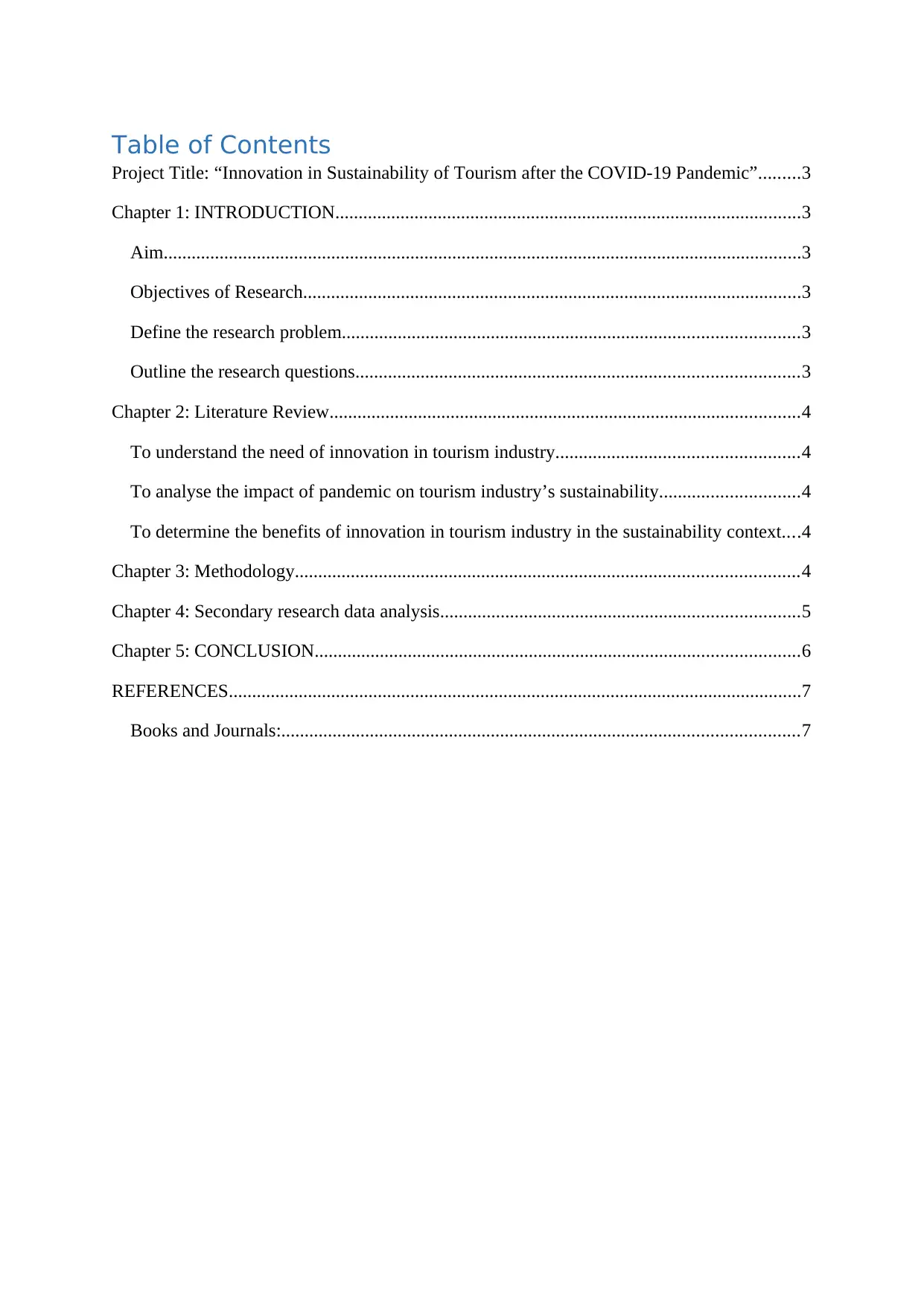
Table of Contents
Project Title: “Innovation in Sustainability of Tourism after the COVID-19 Pandemic”.........3
Chapter 1: INTRODUCTION....................................................................................................3
Aim.........................................................................................................................................3
Objectives of Research...........................................................................................................3
Define the research problem..................................................................................................3
Outline the research questions...............................................................................................3
Chapter 2: Literature Review.....................................................................................................4
To understand the need of innovation in tourism industry....................................................4
To analyse the impact of pandemic on tourism industry’s sustainability..............................4
To determine the benefits of innovation in tourism industry in the sustainability context....4
Chapter 3: Methodology............................................................................................................4
Chapter 4: Secondary research data analysis.............................................................................5
Chapter 5: CONCLUSION........................................................................................................6
REFERENCES...........................................................................................................................7
Books and Journals:...............................................................................................................7
Project Title: “Innovation in Sustainability of Tourism after the COVID-19 Pandemic”.........3
Chapter 1: INTRODUCTION....................................................................................................3
Aim.........................................................................................................................................3
Objectives of Research...........................................................................................................3
Define the research problem..................................................................................................3
Outline the research questions...............................................................................................3
Chapter 2: Literature Review.....................................................................................................4
To understand the need of innovation in tourism industry....................................................4
To analyse the impact of pandemic on tourism industry’s sustainability..............................4
To determine the benefits of innovation in tourism industry in the sustainability context....4
Chapter 3: Methodology............................................................................................................4
Chapter 4: Secondary research data analysis.............................................................................5
Chapter 5: CONCLUSION........................................................................................................6
REFERENCES...........................................................................................................................7
Books and Journals:...............................................................................................................7
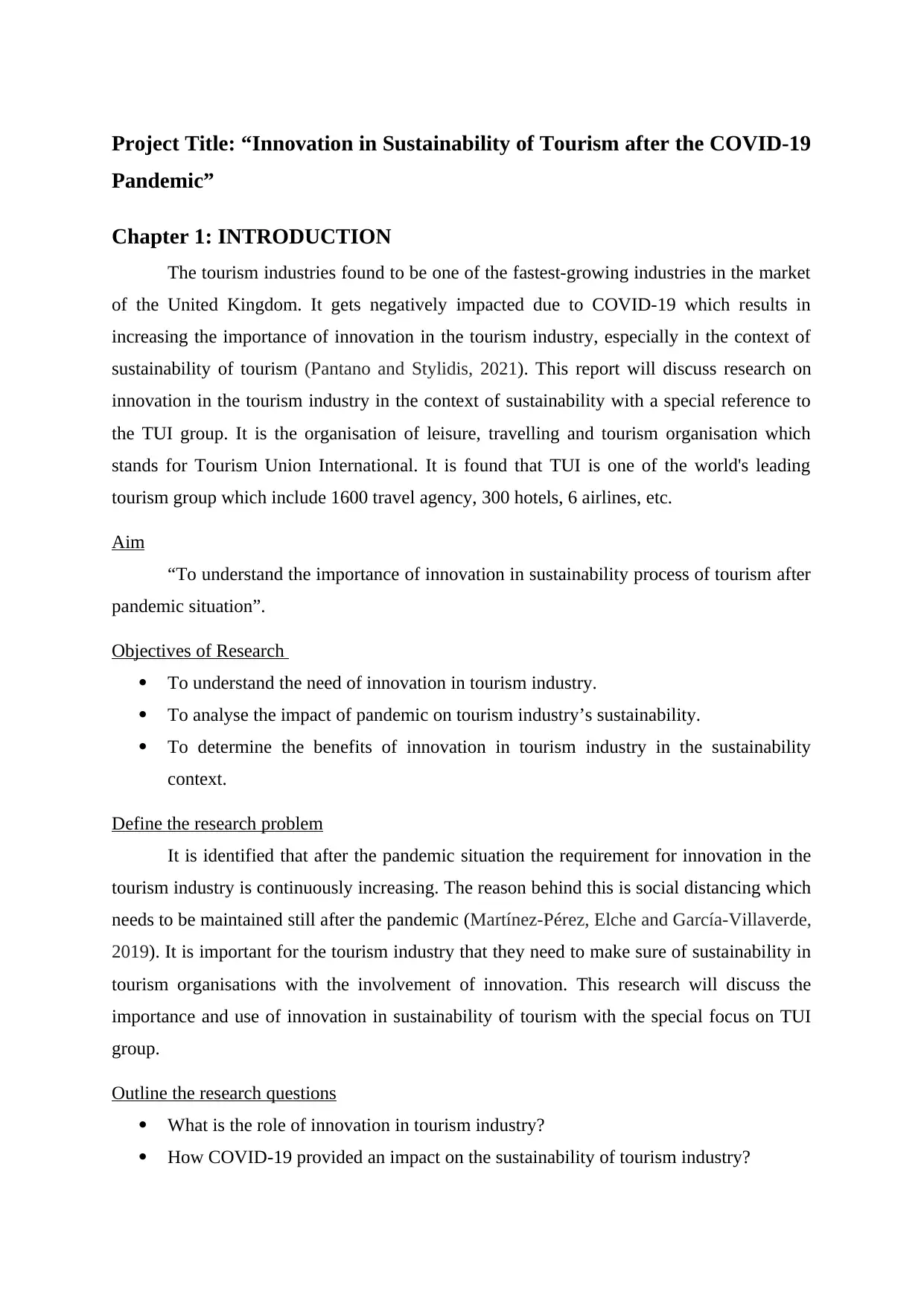
Project Title: “Innovation in Sustainability of Tourism after the COVID-19
Pandemic”
Chapter 1: INTRODUCTION
The tourism industries found to be one of the fastest-growing industries in the market
of the United Kingdom. It gets negatively impacted due to COVID-19 which results in
increasing the importance of innovation in the tourism industry, especially in the context of
sustainability of tourism (Pantano and Stylidis, 2021). This report will discuss research on
innovation in the tourism industry in the context of sustainability with a special reference to
the TUI group. It is the organisation of leisure, travelling and tourism organisation which
stands for Tourism Union International. It is found that TUI is one of the world's leading
tourism group which include 1600 travel agency, 300 hotels, 6 airlines, etc.
Aim
“To understand the importance of innovation in sustainability process of tourism after
pandemic situation”.
Objectives of Research
To understand the need of innovation in tourism industry.
To analyse the impact of pandemic on tourism industry’s sustainability.
To determine the benefits of innovation in tourism industry in the sustainability
context.
Define the research problem
It is identified that after the pandemic situation the requirement for innovation in the
tourism industry is continuously increasing. The reason behind this is social distancing which
needs to be maintained still after the pandemic (Martínez-Pérez, Elche and García-Villaverde,
2019). It is important for the tourism industry that they need to make sure of sustainability in
tourism organisations with the involvement of innovation. This research will discuss the
importance and use of innovation in sustainability of tourism with the special focus on TUI
group.
Outline the research questions
What is the role of innovation in tourism industry?
How COVID-19 provided an impact on the sustainability of tourism industry?
Pandemic”
Chapter 1: INTRODUCTION
The tourism industries found to be one of the fastest-growing industries in the market
of the United Kingdom. It gets negatively impacted due to COVID-19 which results in
increasing the importance of innovation in the tourism industry, especially in the context of
sustainability of tourism (Pantano and Stylidis, 2021). This report will discuss research on
innovation in the tourism industry in the context of sustainability with a special reference to
the TUI group. It is the organisation of leisure, travelling and tourism organisation which
stands for Tourism Union International. It is found that TUI is one of the world's leading
tourism group which include 1600 travel agency, 300 hotels, 6 airlines, etc.
Aim
“To understand the importance of innovation in sustainability process of tourism after
pandemic situation”.
Objectives of Research
To understand the need of innovation in tourism industry.
To analyse the impact of pandemic on tourism industry’s sustainability.
To determine the benefits of innovation in tourism industry in the sustainability
context.
Define the research problem
It is identified that after the pandemic situation the requirement for innovation in the
tourism industry is continuously increasing. The reason behind this is social distancing which
needs to be maintained still after the pandemic (Martínez-Pérez, Elche and García-Villaverde,
2019). It is important for the tourism industry that they need to make sure of sustainability in
tourism organisations with the involvement of innovation. This research will discuss the
importance and use of innovation in sustainability of tourism with the special focus on TUI
group.
Outline the research questions
What is the role of innovation in tourism industry?
How COVID-19 provided an impact on the sustainability of tourism industry?
⊘ This is a preview!⊘
Do you want full access?
Subscribe today to unlock all pages.

Trusted by 1+ million students worldwide
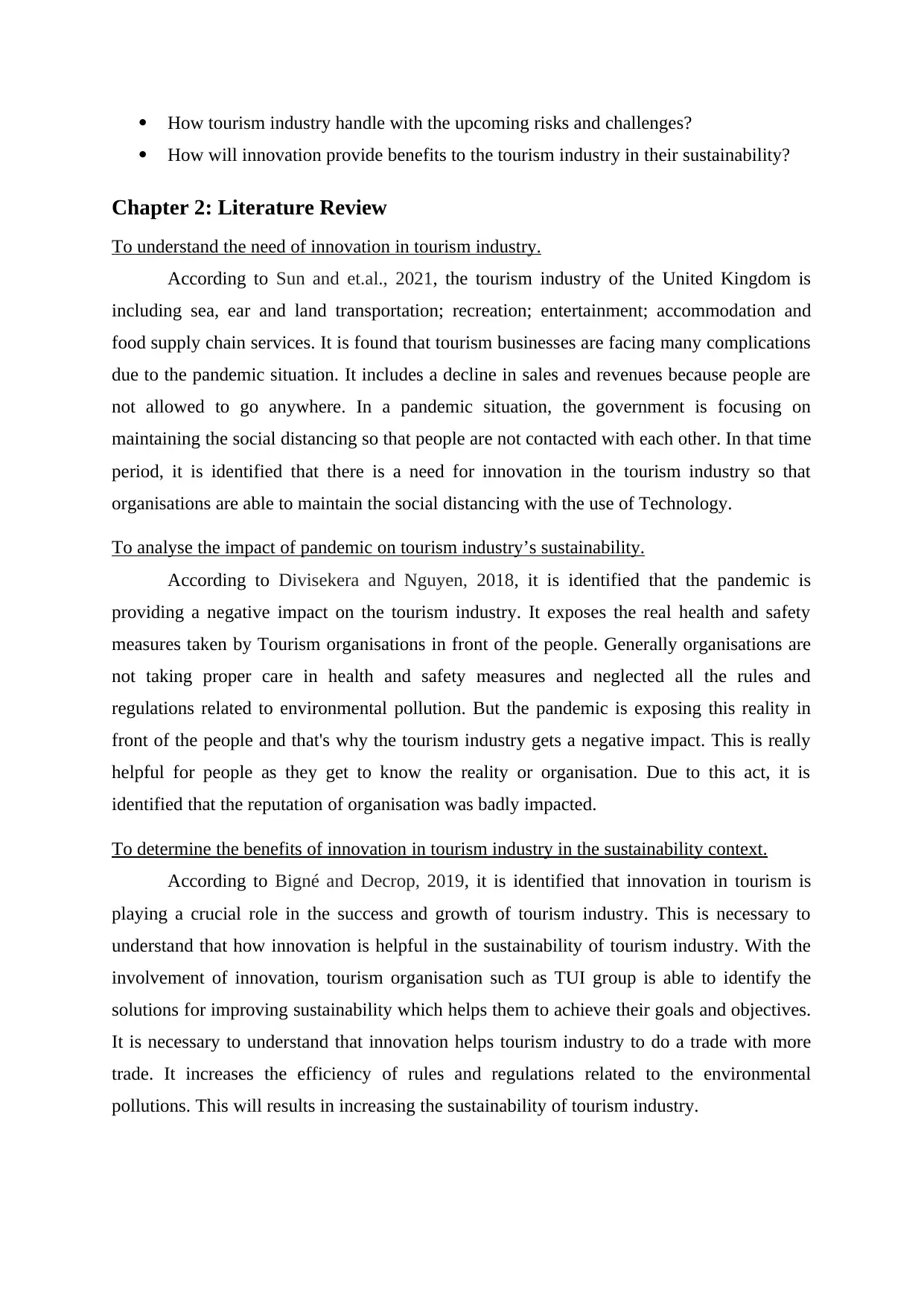
How tourism industry handle with the upcoming risks and challenges?
How will innovation provide benefits to the tourism industry in their sustainability?
Chapter 2: Literature Review
To understand the need of innovation in tourism industry.
According to Sun and et.al., 2021, the tourism industry of the United Kingdom is
including sea, ear and land transportation; recreation; entertainment; accommodation and
food supply chain services. It is found that tourism businesses are facing many complications
due to the pandemic situation. It includes a decline in sales and revenues because people are
not allowed to go anywhere. In a pandemic situation, the government is focusing on
maintaining the social distancing so that people are not contacted with each other. In that time
period, it is identified that there is a need for innovation in the tourism industry so that
organisations are able to maintain the social distancing with the use of Technology.
To analyse the impact of pandemic on tourism industry’s sustainability.
According to Divisekera and Nguyen, 2018, it is identified that the pandemic is
providing a negative impact on the tourism industry. It exposes the real health and safety
measures taken by Tourism organisations in front of the people. Generally organisations are
not taking proper care in health and safety measures and neglected all the rules and
regulations related to environmental pollution. But the pandemic is exposing this reality in
front of the people and that's why the tourism industry gets a negative impact. This is really
helpful for people as they get to know the reality or organisation. Due to this act, it is
identified that the reputation of organisation was badly impacted.
To determine the benefits of innovation in tourism industry in the sustainability context.
According to Bigné and Decrop, 2019, it is identified that innovation in tourism is
playing a crucial role in the success and growth of tourism industry. This is necessary to
understand that how innovation is helpful in the sustainability of tourism industry. With the
involvement of innovation, tourism organisation such as TUI group is able to identify the
solutions for improving sustainability which helps them to achieve their goals and objectives.
It is necessary to understand that innovation helps tourism industry to do a trade with more
trade. It increases the efficiency of rules and regulations related to the environmental
pollutions. This will results in increasing the sustainability of tourism industry.
How will innovation provide benefits to the tourism industry in their sustainability?
Chapter 2: Literature Review
To understand the need of innovation in tourism industry.
According to Sun and et.al., 2021, the tourism industry of the United Kingdom is
including sea, ear and land transportation; recreation; entertainment; accommodation and
food supply chain services. It is found that tourism businesses are facing many complications
due to the pandemic situation. It includes a decline in sales and revenues because people are
not allowed to go anywhere. In a pandemic situation, the government is focusing on
maintaining the social distancing so that people are not contacted with each other. In that time
period, it is identified that there is a need for innovation in the tourism industry so that
organisations are able to maintain the social distancing with the use of Technology.
To analyse the impact of pandemic on tourism industry’s sustainability.
According to Divisekera and Nguyen, 2018, it is identified that the pandemic is
providing a negative impact on the tourism industry. It exposes the real health and safety
measures taken by Tourism organisations in front of the people. Generally organisations are
not taking proper care in health and safety measures and neglected all the rules and
regulations related to environmental pollution. But the pandemic is exposing this reality in
front of the people and that's why the tourism industry gets a negative impact. This is really
helpful for people as they get to know the reality or organisation. Due to this act, it is
identified that the reputation of organisation was badly impacted.
To determine the benefits of innovation in tourism industry in the sustainability context.
According to Bigné and Decrop, 2019, it is identified that innovation in tourism is
playing a crucial role in the success and growth of tourism industry. This is necessary to
understand that how innovation is helpful in the sustainability of tourism industry. With the
involvement of innovation, tourism organisation such as TUI group is able to identify the
solutions for improving sustainability which helps them to achieve their goals and objectives.
It is necessary to understand that innovation helps tourism industry to do a trade with more
trade. It increases the efficiency of rules and regulations related to the environmental
pollutions. This will results in increasing the sustainability of tourism industry.
Paraphrase This Document
Need a fresh take? Get an instant paraphrase of this document with our AI Paraphraser
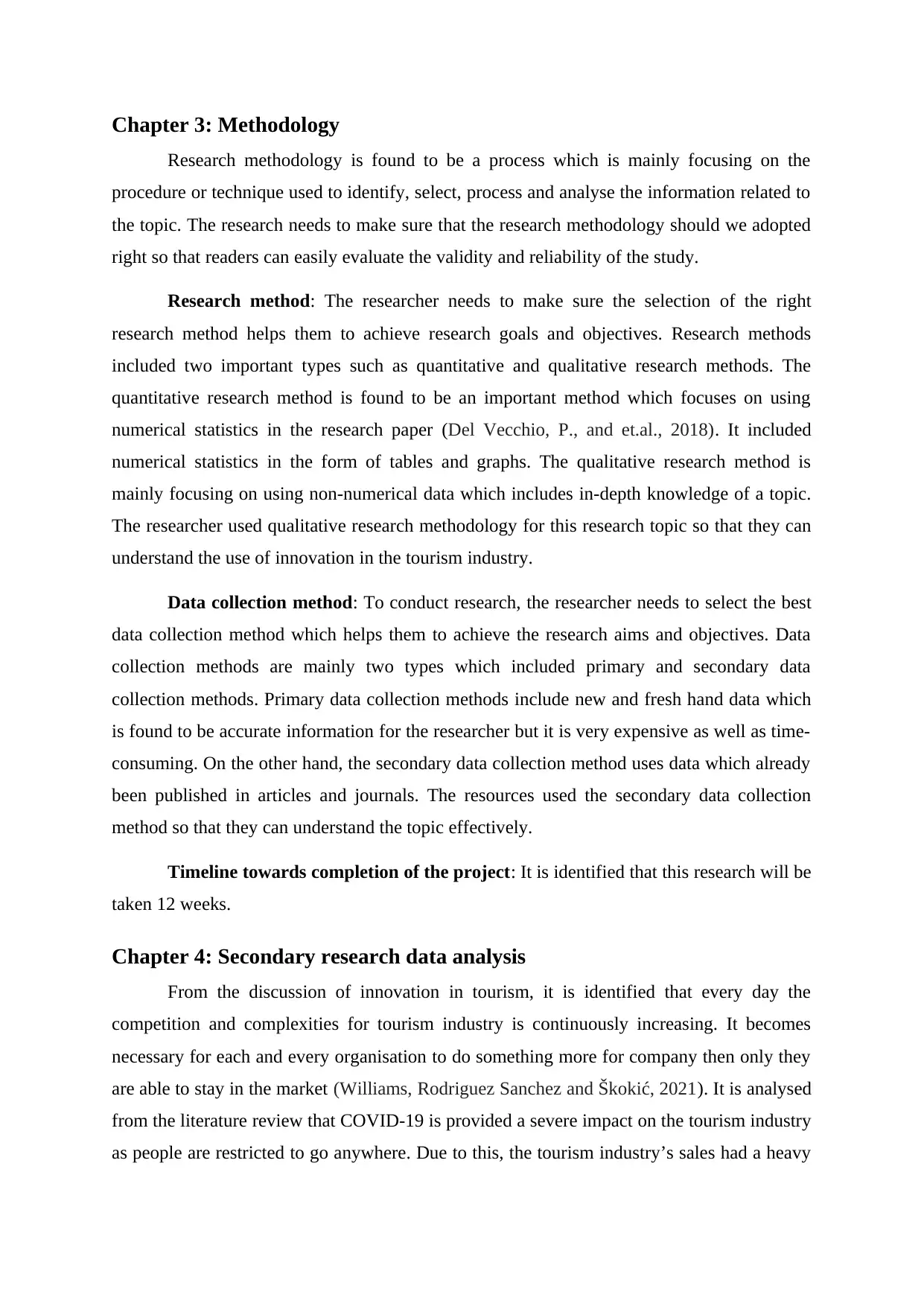
Chapter 3: Methodology
Research methodology is found to be a process which is mainly focusing on the
procedure or technique used to identify, select, process and analyse the information related to
the topic. The research needs to make sure that the research methodology should we adopted
right so that readers can easily evaluate the validity and reliability of the study.
Research method: The researcher needs to make sure the selection of the right
research method helps them to achieve research goals and objectives. Research methods
included two important types such as quantitative and qualitative research methods. The
quantitative research method is found to be an important method which focuses on using
numerical statistics in the research paper (Del Vecchio, P., and et.al., 2018). It included
numerical statistics in the form of tables and graphs. The qualitative research method is
mainly focusing on using non-numerical data which includes in-depth knowledge of a topic.
The researcher used qualitative research methodology for this research topic so that they can
understand the use of innovation in the tourism industry.
Data collection method: To conduct research, the researcher needs to select the best
data collection method which helps them to achieve the research aims and objectives. Data
collection methods are mainly two types which included primary and secondary data
collection methods. Primary data collection methods include new and fresh hand data which
is found to be accurate information for the researcher but it is very expensive as well as time-
consuming. On the other hand, the secondary data collection method uses data which already
been published in articles and journals. The resources used the secondary data collection
method so that they can understand the topic effectively.
Timeline towards completion of the project: It is identified that this research will be
taken 12 weeks.
Chapter 4: Secondary research data analysis
From the discussion of innovation in tourism, it is identified that every day the
competition and complexities for tourism industry is continuously increasing. It becomes
necessary for each and every organisation to do something more for company then only they
are able to stay in the market (Williams, Rodriguez Sanchez and Škokić, 2021). It is analysed
from the literature review that COVID-19 is provided a severe impact on the tourism industry
as people are restricted to go anywhere. Due to this, the tourism industry’s sales had a heavy
Research methodology is found to be a process which is mainly focusing on the
procedure or technique used to identify, select, process and analyse the information related to
the topic. The research needs to make sure that the research methodology should we adopted
right so that readers can easily evaluate the validity and reliability of the study.
Research method: The researcher needs to make sure the selection of the right
research method helps them to achieve research goals and objectives. Research methods
included two important types such as quantitative and qualitative research methods. The
quantitative research method is found to be an important method which focuses on using
numerical statistics in the research paper (Del Vecchio, P., and et.al., 2018). It included
numerical statistics in the form of tables and graphs. The qualitative research method is
mainly focusing on using non-numerical data which includes in-depth knowledge of a topic.
The researcher used qualitative research methodology for this research topic so that they can
understand the use of innovation in the tourism industry.
Data collection method: To conduct research, the researcher needs to select the best
data collection method which helps them to achieve the research aims and objectives. Data
collection methods are mainly two types which included primary and secondary data
collection methods. Primary data collection methods include new and fresh hand data which
is found to be accurate information for the researcher but it is very expensive as well as time-
consuming. On the other hand, the secondary data collection method uses data which already
been published in articles and journals. The resources used the secondary data collection
method so that they can understand the topic effectively.
Timeline towards completion of the project: It is identified that this research will be
taken 12 weeks.
Chapter 4: Secondary research data analysis
From the discussion of innovation in tourism, it is identified that every day the
competition and complexities for tourism industry is continuously increasing. It becomes
necessary for each and every organisation to do something more for company then only they
are able to stay in the market (Williams, Rodriguez Sanchez and Škokić, 2021). It is analysed
from the literature review that COVID-19 is provided a severe impact on the tourism industry
as people are restricted to go anywhere. Due to this, the tourism industry’s sales had a heavy
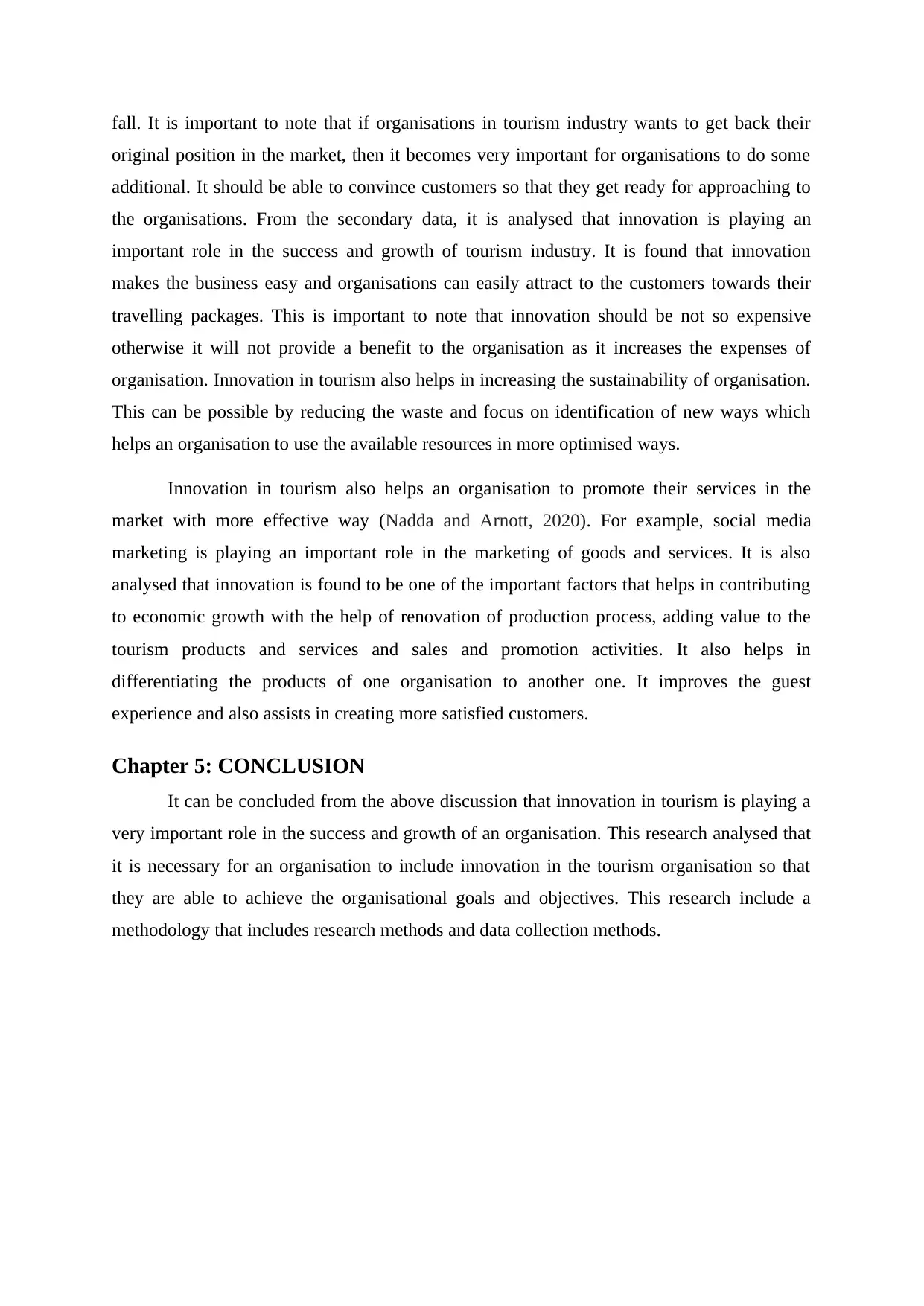
fall. It is important to note that if organisations in tourism industry wants to get back their
original position in the market, then it becomes very important for organisations to do some
additional. It should be able to convince customers so that they get ready for approaching to
the organisations. From the secondary data, it is analysed that innovation is playing an
important role in the success and growth of tourism industry. It is found that innovation
makes the business easy and organisations can easily attract to the customers towards their
travelling packages. This is important to note that innovation should be not so expensive
otherwise it will not provide a benefit to the organisation as it increases the expenses of
organisation. Innovation in tourism also helps in increasing the sustainability of organisation.
This can be possible by reducing the waste and focus on identification of new ways which
helps an organisation to use the available resources in more optimised ways.
Innovation in tourism also helps an organisation to promote their services in the
market with more effective way (Nadda and Arnott, 2020). For example, social media
marketing is playing an important role in the marketing of goods and services. It is also
analysed that innovation is found to be one of the important factors that helps in contributing
to economic growth with the help of renovation of production process, adding value to the
tourism products and services and sales and promotion activities. It also helps in
differentiating the products of one organisation to another one. It improves the guest
experience and also assists in creating more satisfied customers.
Chapter 5: CONCLUSION
It can be concluded from the above discussion that innovation in tourism is playing a
very important role in the success and growth of an organisation. This research analysed that
it is necessary for an organisation to include innovation in the tourism organisation so that
they are able to achieve the organisational goals and objectives. This research include a
methodology that includes research methods and data collection methods.
original position in the market, then it becomes very important for organisations to do some
additional. It should be able to convince customers so that they get ready for approaching to
the organisations. From the secondary data, it is analysed that innovation is playing an
important role in the success and growth of tourism industry. It is found that innovation
makes the business easy and organisations can easily attract to the customers towards their
travelling packages. This is important to note that innovation should be not so expensive
otherwise it will not provide a benefit to the organisation as it increases the expenses of
organisation. Innovation in tourism also helps in increasing the sustainability of organisation.
This can be possible by reducing the waste and focus on identification of new ways which
helps an organisation to use the available resources in more optimised ways.
Innovation in tourism also helps an organisation to promote their services in the
market with more effective way (Nadda and Arnott, 2020). For example, social media
marketing is playing an important role in the marketing of goods and services. It is also
analysed that innovation is found to be one of the important factors that helps in contributing
to economic growth with the help of renovation of production process, adding value to the
tourism products and services and sales and promotion activities. It also helps in
differentiating the products of one organisation to another one. It improves the guest
experience and also assists in creating more satisfied customers.
Chapter 5: CONCLUSION
It can be concluded from the above discussion that innovation in tourism is playing a
very important role in the success and growth of an organisation. This research analysed that
it is necessary for an organisation to include innovation in the tourism organisation so that
they are able to achieve the organisational goals and objectives. This research include a
methodology that includes research methods and data collection methods.
⊘ This is a preview!⊘
Do you want full access?
Subscribe today to unlock all pages.

Trusted by 1+ million students worldwide
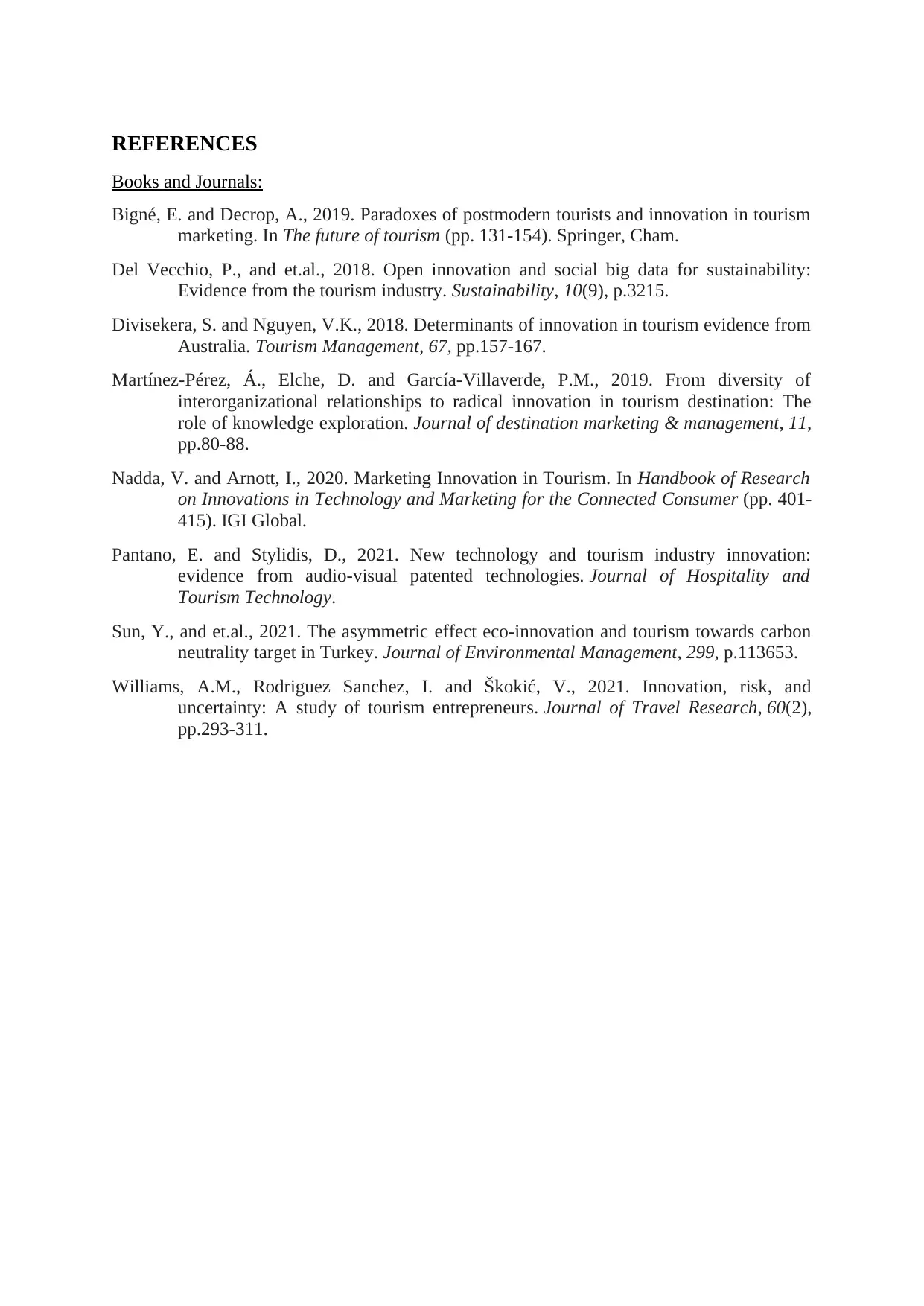
REFERENCES
Books and Journals:
Bigné, E. and Decrop, A., 2019. Paradoxes of postmodern tourists and innovation in tourism
marketing. In The future of tourism (pp. 131-154). Springer, Cham.
Del Vecchio, P., and et.al., 2018. Open innovation and social big data for sustainability:
Evidence from the tourism industry. Sustainability, 10(9), p.3215.
Divisekera, S. and Nguyen, V.K., 2018. Determinants of innovation in tourism evidence from
Australia. Tourism Management, 67, pp.157-167.
Martínez-Pérez, Á., Elche, D. and García-Villaverde, P.M., 2019. From diversity of
interorganizational relationships to radical innovation in tourism destination: The
role of knowledge exploration. Journal of destination marketing & management, 11,
pp.80-88.
Nadda, V. and Arnott, I., 2020. Marketing Innovation in Tourism. In Handbook of Research
on Innovations in Technology and Marketing for the Connected Consumer (pp. 401-
415). IGI Global.
Pantano, E. and Stylidis, D., 2021. New technology and tourism industry innovation:
evidence from audio-visual patented technologies. Journal of Hospitality and
Tourism Technology.
Sun, Y., and et.al., 2021. The asymmetric effect eco-innovation and tourism towards carbon
neutrality target in Turkey. Journal of Environmental Management, 299, p.113653.
Williams, A.M., Rodriguez Sanchez, I. and Škokić, V., 2021. Innovation, risk, and
uncertainty: A study of tourism entrepreneurs. Journal of Travel Research, 60(2),
pp.293-311.
Books and Journals:
Bigné, E. and Decrop, A., 2019. Paradoxes of postmodern tourists and innovation in tourism
marketing. In The future of tourism (pp. 131-154). Springer, Cham.
Del Vecchio, P., and et.al., 2018. Open innovation and social big data for sustainability:
Evidence from the tourism industry. Sustainability, 10(9), p.3215.
Divisekera, S. and Nguyen, V.K., 2018. Determinants of innovation in tourism evidence from
Australia. Tourism Management, 67, pp.157-167.
Martínez-Pérez, Á., Elche, D. and García-Villaverde, P.M., 2019. From diversity of
interorganizational relationships to radical innovation in tourism destination: The
role of knowledge exploration. Journal of destination marketing & management, 11,
pp.80-88.
Nadda, V. and Arnott, I., 2020. Marketing Innovation in Tourism. In Handbook of Research
on Innovations in Technology and Marketing for the Connected Consumer (pp. 401-
415). IGI Global.
Pantano, E. and Stylidis, D., 2021. New technology and tourism industry innovation:
evidence from audio-visual patented technologies. Journal of Hospitality and
Tourism Technology.
Sun, Y., and et.al., 2021. The asymmetric effect eco-innovation and tourism towards carbon
neutrality target in Turkey. Journal of Environmental Management, 299, p.113653.
Williams, A.M., Rodriguez Sanchez, I. and Škokić, V., 2021. Innovation, risk, and
uncertainty: A study of tourism entrepreneurs. Journal of Travel Research, 60(2),
pp.293-311.
1 out of 7
Related Documents
Your All-in-One AI-Powered Toolkit for Academic Success.
+13062052269
info@desklib.com
Available 24*7 on WhatsApp / Email
![[object Object]](/_next/static/media/star-bottom.7253800d.svg)
Unlock your academic potential
Copyright © 2020–2026 A2Z Services. All Rights Reserved. Developed and managed by ZUCOL.


